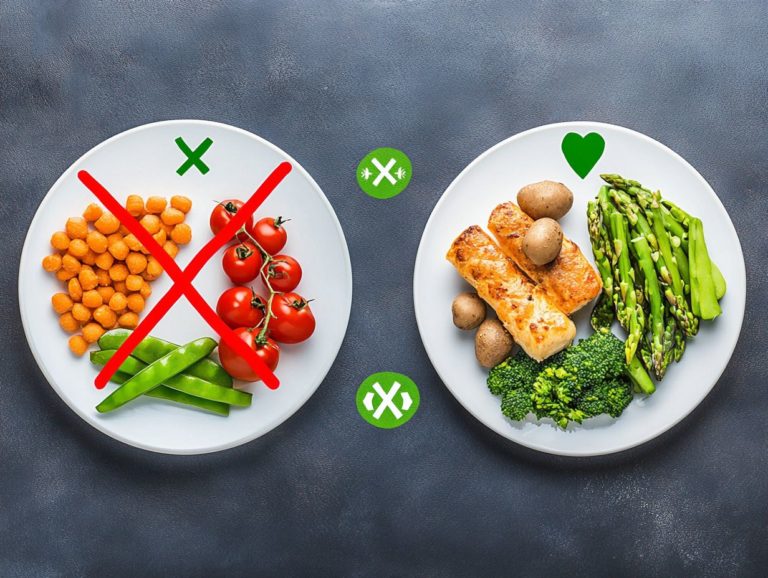Are Supplements Necessary? Let’s Find Out
Supplements are a captivating subject in health and wellness, often raising questions about their necessity and effectiveness. With an overwhelming array of options at your fingertips, it can be challenging to discern whether you truly need them.
This article will excite you about the key factors to consider when evaluating supplements, shedding light on their potential benefits and possible risks. It will also guide you in selecting the right supplements and seamlessly integrating them into your diet.
By the end, you ll know if supplements are the right choice for you let s dive in!
Contents
- Key Takeaways on Supplements:
- Do You Need Supplements?
- Benefits of Supplements
- Potential Risks of Supplements
- Choosing the Right Supplements
- Integrating Supplements into Your Diet
- Frequently Asked Questions
- Are Supplements Necessary?
- What are some situations where supplements may be necessary?
- Do supplements have any possible risks or side effects?
- Can supplements replace a healthy diet?
- What are some important factors to consider when choosing supplements?
- Are there any natural alternatives to supplements?
Key Takeaways on Supplements:

Supplements can enhance your health. However, their necessity varies based on your diet, lifestyle, and health conditions. Always consult a healthcare professional before starting supplements to avoid risks.
What are Supplements?
Supplements, including dietary ones like multivitamins, are made to boost your intake of essential nutrients, vitamins, and minerals.
These products come in various forms think capsules, tablets, powders, and liquids and are often utilized to fill gaps in your diet.
Although regulated by the FDA, the composition and health claims of these supplements can differ significantly. It s crucial for you to grasp exactly what they offer.
The primary function of dietary supplements is to improve your overall health, particularly if you find it challenging to obtain sufficient nutrients from food alone.
For example, individuals on restrictive diets or those with certain medical conditions may not get enough vitamins or minerals that supplements can help address.
It s essential to remember that while the FDA supervises the safety and labeling of these products, it does not endorse dietary supplements for their effectiveness before they reach the market.
That s why it s wise for you to conduct thorough research and consult healthcare professionals to ensure you make informed choices, tailoring supplements to your unique health needs.
Do You Need Supplements?
Determining if you need dietary supplements depends on several key factors, such as your nutritional intake, lifestyle, and individual health needs.
It is essential to critically evaluate your eating habits and seek guidance from a healthcare provider. They can provide you with information tailored to your unique nutritional requirements and help identify any possible nutrient deficiencies you may have.
Factors to Consider
When you’re considering dietary supplements, several factors come into play, including your specific nutrient needs and any long-term health issues you might have.
Special populations, such as pregnant women, often have unique requirements that may lead them to opt for specialized supplements like pregnancy vitamins.
If you have dietary restrictions be it vegetarianism or food allergies you may find it challenging to meet your nutritional needs through food alone. Lifestyle factors also weigh heavily; your exercise routine and stress levels can significantly influence nutrient absorption and requirements.
For example, athletes often need extra protein or creatine to support muscle recovery and enhance performance.
Evaluate your current health status and any age-related changes or routine medical check-ups that can shed light on any deficiencies or excesses. These insights can be invaluable in determining whether supplementation is necessary for you.
Benefits of Supplements

Dietary supplements can offer a multitude of health benefits, serving as a valuable means to enhance your nutrition and support your overall well-being.
For example, vitamin C is renowned for its immune-boosting properties, while fish oil is lauded for its omega-3 fatty acids, which can promote heart health and lower the risk of chronic diseases.
By incorporating these supplements into your routine, you’re taking a proactive approach to your health that can yield significant rewards.
Specific Nutrients and Health Benefits
Specific nutrients like vitamin D, vitamin B12, and vitamin E offer impressive health benefits. They play a pivotal role in boosting your immune system and enhancing your overall well-being.
Omega-3 fatty acids, commonly found in fish oil, contribute significantly to heart health. They also help reduce inflammation.
These vitamins and minerals support many bodily functions. Vitamin D helps bone health by aiding in calcium absorption.
B12 is vital for nerve function and energy production. Vitamin E is known for its antioxidant properties, which fight oxidative stress.
Choosing health supplements that undergo rigorous quality testing ensures you are enhancing your well-being with trusted sources of essential nutrients.
Potential Risks of Supplements
Dietary supplements can offer many health benefits. However, they come with risks, especially if not used properly.
While the FDA enforces regulations for safety, you must stay informed about the correct dosages. This vigilance helps avoid adverse reactions and supports your health journey.
Side Effects and Interactions
Dietary supplements might cause side effects if taken in excess or with certain medications. Be aware of how specific ingredients may interact with prescription drugs or herbal products.
For example, omega-3 fatty acids can thin the blood, increasing bleeding risk when combined with blood thinners. Similarly, high doses of vitamin E can disrupt blood clotting, making it crucial to discuss new supplements with a healthcare provider.
Be cautious about combining calcium with certain antibiotics, as this can impede absorption. Understanding these risks is vital for maintaining your overall health.
Choosing the Right Supplements

Selecting the right dietary supplements requires careful attention to supplement facts, quality, and FDA oversight. Choose reputable brands that adhere to strict safety standards and provide clear product information.
This is especially important for multivitamins, where informed choices can impact your health.
Factors to Consider When Selecting Supplements
When choosing dietary supplements, consider the ingredients, dietary guidelines, and your nutrient intake. Consulting a healthcare provider can help you make informed decisions for your health needs.
Examine the quality and source of ingredients, ensuring they are free from harmful additives. Following dietary guidelines supports wellness and minimizes side effects.
Your health conditions and lifestyle choices greatly influence which supplements are best for you. Professional guidance can offer tailored recommendations to navigate the options available.
Integrating Supplements into Your Diet
Integrating dietary supplements into your routine requires a thoughtful approach. Aim to enhance your nutrient intake without replacing whole food sources.
By balancing your diet with nutrient-dense foods rich in vitamins, you can effectively support your health. Ensure that supplements are a helpful addition, not a substitute.
Safe and Effective Ways to Use Supplements
To use dietary supplements safely, follow dietary guidelines. Consult with your healthcare provider and stick to recommended dosages for multivitamin tablets and other supplements.
This way, you can enhance your diet without risking excessive intake or negative interactions. Pay close attention to how your body responds to any new supplement you introduce into your routine.
Keep a journal to track changes or side effects. This helps you adjust dosages or stop use if needed.
Consider if the supplement fits your health goals. Always prioritize a balanced diet as your main nutrient source, supplementing only when necessary.
This mindful approach keeps you healthy and boosts your confidence in your choices.
Frequently Asked Questions

Are Supplements Necessary?
In many cases, supplements are not necessary. Our bodies can obtain all the necessary nutrients from a balanced diet. However, some situations may make supplements helpful or necessary.
What are some situations where supplements may be necessary?
Supplements may be necessary for individuals with medical conditions like vitamin deficiencies, malabsorption issues, or specific dietary restrictions. They may also benefit pregnant women, athletes, and individuals with restricted diets.
Do supplements have any possible risks or side effects?
As with any medication or supplement, there is a possibility of risks and side effects. Talk to a healthcare professional before starting any new supplements. Some supplements may interact with medications or adversely affect certain medical conditions.
Can supplements replace a healthy diet?
No, supplements should not replace a healthy and balanced diet. They should only supplement a healthy diet and not serve as a primary nutrient source.
What are some important factors to consider when choosing supplements?
When choosing supplements, consider the manufacturer’s reputation, the ingredients used, and any potential risks or interactions. It s also wise to consult with a healthcare professional to find the most beneficial supplements for your needs.
Are there any natural alternatives to supplements?
Yes, many natural alternatives can provide necessary nutrients. These include eating a variety of whole foods, incorporating superfoods into your diet, and using herbs and spices for added health benefits. It s best to talk to a healthcare professional before starting any new natural regimen.






